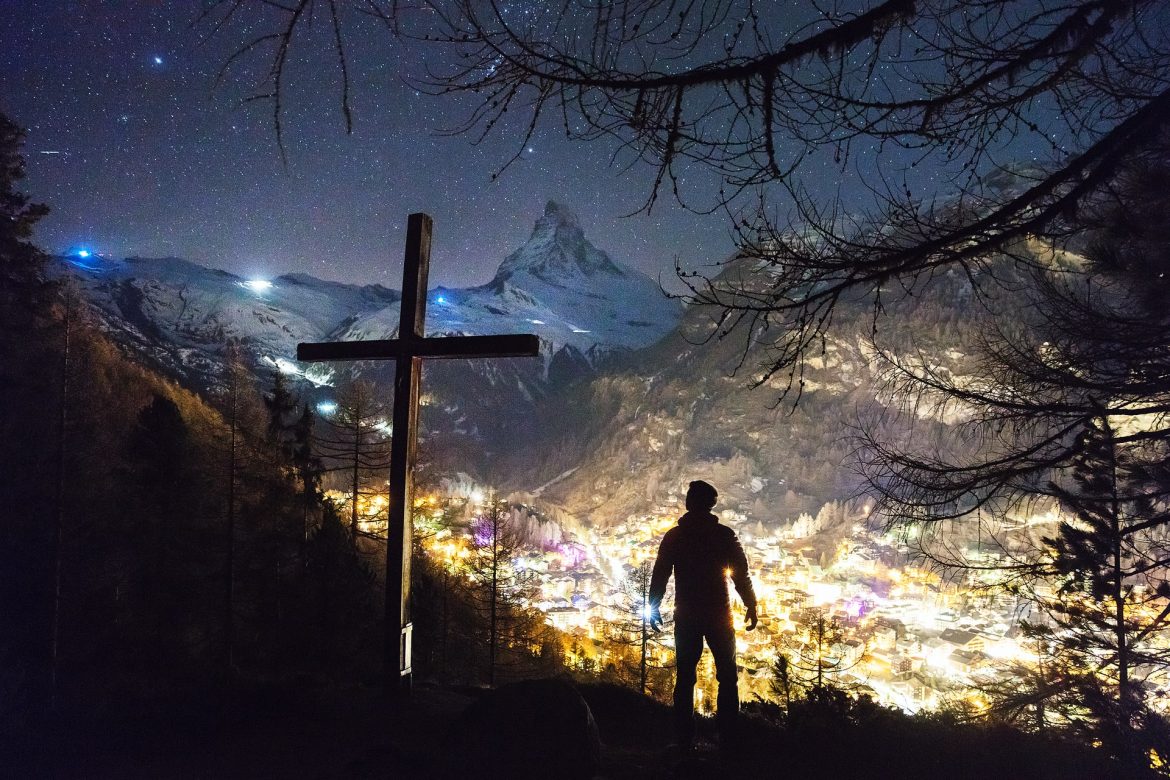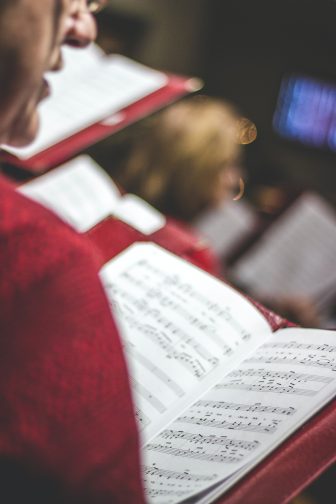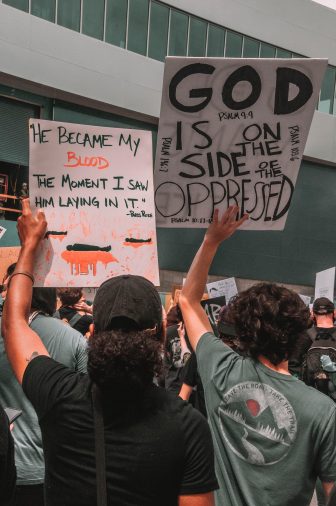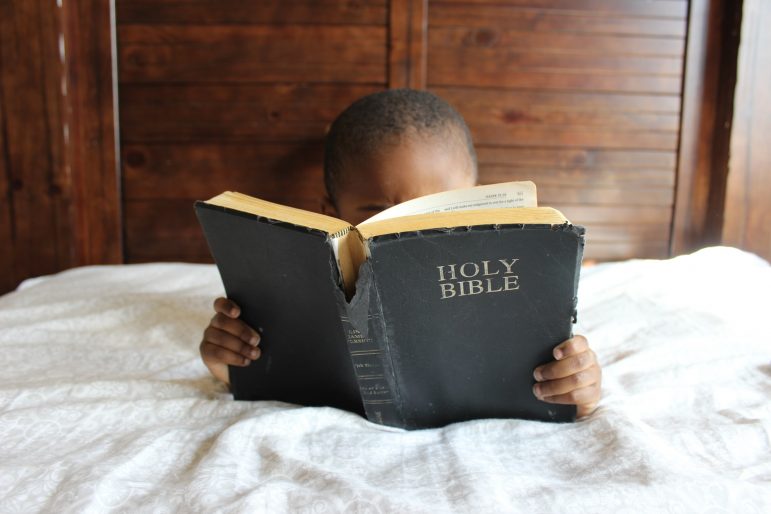The only thing I miss about my Southern Baptist childhood is the music—the melancholy solace of spirituals like “Wayfaring Stranger,” the earthly intimacy of “In the Garden,” the contemplative “Sweet Hour of Prayer,” and the haunting shape-note singing that embraces dissonance in a way this religion’s dogma does not. In music, dissonance, like diversity, deepens the song, it is like an acoustic dark light shining on us all, no matter our color.
Many of the songs the protesters in our cities are now singing are traditional spirituals that belong to both blacks and whites. At George Floyd’s funeral, the choir sang the soaring, “My Life is in Your Hands.” Eddie Glaude, of Princeton University, covering the funeral live, almost wept as he sang on camera, “Precious Lord, take my hand, lead me on, let me stand, I am tired, I am weak, I am worn.”
African Americans in our country are weary and worn out with waiting for white people to hear their pain, which like a song, has been passed down for too many generations. The Reverend Dr. William J. Barber II, in tracing the white evangelical nationalist faithful—those 81 percent who voted for Trump and still fervently stand by him—said, they must believe that “a god who does not bless white America’s fear and nostalgia is no god at all.” These powerful words were not delivered at a wake for George Floyd’s murder; this was a speech entitled, “The Racist history of Southern white evangelicalism and the rise of Donald Trump,” given in November of 2016, right after Trump’s election. Rev. Barber was responding to his evangelical “brother,” Franklin Graham, televangelist Billy Graham’s son, who is still a staunch soldier for Trump on the campaign trail. Franklin Graham heartily applauded Trump’s stroll through Lafayette Park, after the teargassing of peaceful protesters, for a photo op in front of the so-called president’s church. Trump held the Bible like a shield. But it was really being used as a weapon. A weapon of mass division.
I grimaced when I witnessed this image of a man who can’t quote a single line of scripture without a teleprompter, who held the sacred text upside down like a hefty propaganda pamphlet—Bible as blunt instrument to bludgeon any backsliding believers and voters, back into submission. Trump’s acolytes accompanying him on this sacrilegious walk were his slavish disciple, AG Barr, and a military escort in camouflage to protect the president, but not the protesters.
Many of the songs the protesters in our cities are now singing are traditional spirituals that belong to both blacks and whites.
The photo op flashed me back to my Virginia childhood and the Southern Baptist Sword Drills when young contestants held the Bible as armament— sword and shield. Sword Drills were the equivalent of quasi-military spelling bees for kids with a Bible weaponized for competition. Young contestants would stand in a straight line on stage at strict attention, as if on a firing squad, our Bibles ready. I had to memorize vast sections of scripture for the state-wide contests, cheered on by my coach.
At twelve, I was not a zealot. My family was not racist, but they were super religious. Yet I was beginning to doubt everything I’d been taught, ever since I’d been thrown out of Vacation Bible School, when the teacher made us children get down on our knees to pray for God to find her contact lens.
“God’s busy,” I’d said, refusing to bend the knee for that silly prayer. I was happily exiled from her class.
Just as years later, in high school, I would be sent to work for a summer at the Southern Baptist retreat, Glorieta, in New Mexico. It felt like a religious boot camp. As I slaved away in faux Indian costume serving hungry mobs in the cafeteria, I watched busloads of believers roll up, adorned with banners proclaiming, “George Wallace for President.”
Even as a kid, I was much more spiritual than religious. I was drawn to the beautiful verses in the Bible. The lofty King James version with its Old Testament larger-than-life prophets, the poetry of Psalms, the beatitudes of the New Testament Christ. Memorizing Bible passages, reciting them out loud like incantations, like the old spirituals, held a musical power. The Bible was not just a rhythm of righteousness, it was a rich, woven composition that needed all parts. For me, Bible study was not about answers; it was a search for a moral universe. I’d always been uncomfortable with the rigid hierarchy of this Southern Baptist doctrine that even in the turbulent Sixties, cheered on the Vietnam War; still denied churchwomen the right to vote or to be ministers or deacons; a white, evangelical movement with a history of anti-abolitionists and Jim Crow. My doubts plagued my sword drill practices.
“Attention!” my coach would command me like a biblical drill instructor.
Bible clenched at my right side, I snapped up to my full beanpole height, eyes straight ahead as if scanning for a sniper.
“Draw swords!”
With an audible smack of leather binding between my palms, I lifted the Bible to chest level and presented it for inspection—my perfectly oiled and cleaned weapon, the Word.
“And take the helmet of salvation, and the sword of the Spirit, which is the word of God,”
my coach shouted the scripture. “Go . . . go!”
Everything had to be calibrated—both body muscle and memory. My brain scanned to remember the scripture’s location, at the same time my fingers expertly gripped the Bible, thumbing for the verse. The instant I alighted on Ephesians 6:17, my forefinger triumphantly pointed to verse 17. I stepped forward with bold precision, enunciating each word
“Correct!” my coach nodded. “Maybe you can someday take State.”
I doubted it, just as I now doubted that my military drill with the Holy Bible was really righteous. I loved scripture, especially the most lyrical verses, but I was an increasingly mutinous mystic who chafed at the simple answers and formulas of Southern Baptist doctrine. I also was tempted to protest the endless Vietnam War and wanted to join the civil rights movement. Though we lived near Washington, D.C., our junior high was still segregated; there were few, in any, black people in our church. Civil rights protests were everywhere and would, in a few years, soon open my high school. But no peaceful protesters in our Southern Baptist church.
In 1962, the South was still two years away from the Civil Rights Act that would finally end segregation. There were growing street protests, some even led by Baptist ministers, like Martin Luther King, Jr. On his famous road to integration, the Reverend King had been arrested on trumped-up charges, such as driving without a license or attempting to desegregate public buildings. The next year, in 1963, Dr. King would deliver his transcendent “I Have a Dream” speech on the steps of the Lincoln Memorial to a jubilant, racially mixed crowd of 400,00 people.
Our history class was still using a gray tome with a Confederate flag on the cover. “Virginia History” was a required course for seventh graders. It was divided into three sections: the first, which was the bulk of the book, was dotingly devoted to Virginia’s glorious Confederate period. There was a slim section entitled, “The Present,” and for the future there was a ten-page epilogue that no one, not even our teacher, ever discussed. We were relentlessly tested on every battle and engagement of the Civil War. And to my shock, there were regular test questions that even I could see were obviously racist. One question haunts me these decades later as young protesters again fill our streets calling for racial equality. The question: “Negroes are best adapted for work as: (a) minstrels (b) laborers (c) statesmen.” When I answered (c) statesmen, I was scored down because the correct answer was (a) laborers. I protested and the teacher promptly failed me for the whole test.
When my family left the South and what was practically a state religion to move to California during the wonderfully diverse Sixties, I felt liberated. In high school, I joined civil rights and anti-war protests in Berkeley and at my University of California. We believed we would change the world.
~ ~ ~ ~ ~ ~
The two terms of Barack Obama gave us hope we had made a huge change. The correct answer to that Virginia History textbook question was now: (d) president, for the statesman Obama. Yet the Old South racism of white nationalists and the Religious Right prevailed in electing the most racist and authoritarian president in our history. Trump was not only a backlash; he was also a regression. The ugliest American. Our country’s racist and religious shadows, like the proverbial South, rose again. The massive and mostly peaceful protests in 2020 are infiltrated with balaclava-clad far-right agitators wielding bullhorns in my hometown of Seattle; white men sporting MAGA caps and draped in Confederate flags, some carrying real weapons, try to subvert peaceful protests. Now the most un-statesmanlike President our country has ever endured, brandishes the Bible like his personal shield while surrounded with his own military high-ranking disciples.
Dissonance, like diversity, deepens the song.
I marvel that after all these decades, there has been so little real spiritual and racial progress and equality among white evangelicals who still form a major voting block for Trump’s reelection. I mourn that my Southern homeland still clings to a Confederate flag and a White House, forgetting it was built by slave labor. I wonder if the Religious Right will ever recognize Donald Trump as a modern-day Anti-Christ who enslaves the faithful to follow him blindly in a lockstep of religion.
White evangelicals have been painfully slow to question or doubt a president who cynically uses them as another prop, a president who demands churches open during a dreadful pandemic, but forgoes Sunday church for golf; a president who leads only the “chosen” of his base and rails against liberals as heathens; who chants FOX news as scripture and brands any other news source—like other religions—as false. Trump’s “my-way-or-the-highway” dogma is terribly akin to the “I’m going to heaven and you’re not, sinner!” subtext of much of the Religious Right. It’s a frighteningly good fit. Except that the savior the Religious Right worships, resisted the temptations of power, was never a politician, was a protester of corrupt Pharisees. This “prince of peace,” was never a soldier. He was compassionate, a conscientious objector, who taught forgiveness. Christ never went to war, so why is this “dominate the battle space” and Bible-toting president such a well-trod path for his followers?
It’s only by looking deep at the quasi-military, intolerant, and brutal history of white evangelicalism, as Rev. Barber says, that we see the roots of racism revealed. In his response to Franklin Graham’s celebration of Trump’s election, Rev. Barber said Graham “thanks God for the same triumph that the white nationalists of the alt-right celebrate because Graham inherited a religion that accommodated itself to slavery in America and has morphed over and again for 150 years to fuel every backlash against progress toward racial justice in American history.”
It is a sad irony that the Religious Right, who follow a Christ who teaches, “turn the other cheek,” haven’t exercised the spiritual checks-and-balances on this lawless, sinful president. That task has finally fallen to the military. Trained to fight for a cause and all our citizens, the military is our most diverse and respected institution. Revered Generals like Mattis, McRaven, Allen, Dempsey, and many other high-ranking retired Chiefs of Staff, including former Gen. Colin Powell—those real soldiers brave enough to endure war—are finally sending this draft-dodger to a constitutional boot camp. Their new, resistant recruit must learn to obey his drill instructors. Another historic irony is that after Trump’s attempted military coup of the capital and peaceful protesters, his false post-bunker bravado by brandishing the Bible, has backfired—even among some white evangelicals.
Trump’s brutal force and biblical walk of blame
unexpectedly turned into a Walk of Shame.
The New York Times cites new polls that the “president’s standing with the cornerstone of his base isn’t what it used to be. A photo op with the Bible was supposed to help fix that.” In fact, the Bible Trump awkwardly held high as if it were an object “dropped from a flying saucer,” said Eugene Robison, the Pulitzer-prize-winning columnist, was the Revised Standard Version. It is a more liberal version that is “the nemesis of evangelicals.” Trump’s brutal force and biblical walk of blame unexpectedly turned into a Walk of Shame.
Rabbis, Catholic bishops, and many interfaith leaders were appalled at Trump’s militarized Bible brigade. Rabbi Jonah Pesner, director of the Religious Action Center of Reform Judaism, tweeted: “POTUS using a house of worship to shut down the voices of people of color is an affront to people of faith.” The Rev. James Martin, Jesuit priest and author, said: “Let me be clear. This is revolting. The Bible is not a prop. A church is not a photo op. Religion is not a political tool. And God is not a plaything.” The televangelist, Pat Robertson, whose 700 club is cherished by many on the Religious Right, chided Trump: “You just don’t do that, Mr. President . . . We’re one race. And we need to love each other.” Even Russell Moore, the president of the Southern Baptist Convention’s Religious Liberty and Ethics Convention, said he was “brokenhearted and alarmed,” adding that “Americans should listen to what the Bible says about the preciousness of human life, the sins of racism and injustice and the need for safety and calm and justice in the civil arena.”
As many faith leaders are sending Trump to spiritual boot camp with these admonitions, there is still a devoted evangelical voting block this president is counting on for his reelection. White evangelicals make up only 15 percent of the American population, yet their political power, like the antiquated electoral college, could still dominate the popular vote. Even after Trump’s Bible-op backfired among many faith leaders, a new Public Religion Research Institute poll found that “white evangelicals are not slipping in their support for Trump: A remarkable 62 percent of them view him favorably, basically unchanged since last month.” Will the Religious Right’s Christian soldiers march on “as for war” for Trump?
Will the Religious Right ever also march to protest racism?
The Southern Baptist song I never liked was “Onward Christian Soldiers.” It frightened me. Will the Religious Right ever realize they are being used by Trump, a false prophet who has never delivered a soulful and ecumenical Sermon on the Mount to bless the meek? Or, will they close ranks and elect him again, crowning him their “king of kings,” their chosen one. Why haven’t they joined their fellow African American evangelical brethren?
An honest, poignant “Call to Conscience to White, Christian Women,” by The Rev. Jennifer Butler, CEO of Faith in Public Life, who was the chair of President Obama’s advisory council on Faith-Based and Neighborhood Partnership, reminds us that two-thirds of white women voted for Trump in 2016 and two-thirds of those were white, evangelical women who chose Trump, “despite his extensive record of overt bigotry. Meanwhile, 95 percent of black women and two-thirds of Latina women voted against him.” She pleads, “these discrepancies should cut us to the quick and cause us to examine our hearts and souls. Time and time again, why do white women disconnect from women of color?”
~ ~ ~ ~ ~ ~ ~
Long ago I left the church. But a memory of interracial harmony still haunts and inspires me. In my twenties, I was living in Manhattan and working at The New Yorker magazine when a devout Southern Baptist relative visited the city. True believer, she managed to locate in the Yellow Pages the only listing for a Southern Baptist Church. It was not a Southern Baptist Convention church. It was a lively African American evangelical church in the heart of Harlem.
City-savvy after five years in New York, I warned my relative, “We might be taking our lives in our hands. We won’t be welcomed up there.”
She ignored me and warmly greeted the flabbergasted, but genteel deacon, who amiably swept us through the sanctuary door. “We welcome all souls,” he said and waltzed us down the aisle.
We were the only white faces in a sea of singing black people. My relative didn’t bother with the hymnal. She knew all the songs and joined in with her robust soprano. A church pianist herself, she especially admired the organist, whose music swelled over the crowd in billowing bass waves. As the organist swung into “Just a Closer Walk with Thee,” my relative begun tapping her feet as if she, too, were thumping the pedals of her own piano.
“She’s just swell,” she said. “I wish they’d let me swing like that in our church.”
I was too terrified to smile and kept scanning the pews for any signs that we might be unwanted, uninvited, in danger. But other worshippers just nodded, encouraging us as we sang with them one of my favorite hymns, “I Love to Tell the Story.”
The tall, lithe preacher took the podium and delivered a rousing sermon that included quotes from Dr. Martin Luther King, Buddhists mantras, Bible verses, and concluded with a Langston Hughes poem:
“America never was America to me”
After church, we were mobbed by benevolent churchwomen, who had somehow found out from the elderly deacon who first greeted us, that we were from the South. They invited us to their after-service social. My relative satisfied her sweet tooth and complimented the coffee, which was strong and creamy, spiced with chicory, just the way she liked it. She would later say that few Southern Baptist Convention churches came close to the
grace and musical heaven of that Harlem Sunday. For years, they sent her church bulletins and they also kept me on their mailing list. I never went back, though I considered it, just to sing.
It is memories of singing ensemble, blacks and whites belonging together, like those keys on a piano in the Stevie Wonder song, “Ebony and Ivory” that inspire me most. As we protest now for racial justice and equality, will the song finally come true? Will the tragic murder of George Floyd, an “ordinary brother,” as Reverend Al Sharpton sang out so movingly in his eulogy in Houston, at last become the “cornerstone of a movement that’s going to change the whole wide world?”
What gives me hope now are the young evangelicals, some of them protesting now on the streets. My niece in Virginia sends me a link that her governor is removing a statue of Confederate General Robert E. Lee. The Marine Corps announces they will no longer allow its troops to display the battle flag of the Confederacy. In nearby Washington, D.C., the mayor renames the street Trump marched down with his daughter (carrying a Bible in her expensive purse), “Black Lives Matter Plaza.” Another young evangelical friend posts Facebook quotes protesting the immigrant children held in cages and urges his followers to help immigrants become citizens. Another Christian friend sings in a choir performing a song called “Harriet Tubman,” about the heroic slave who worked on the Underground Railroad. The refrain:
Come on up
I’ve got a lifeline
Spirituals and protest songs and elegies being sung for yet another African American killed, to mourn generations of bigotry—these songs belong to everybody, whether we sing them in the streets, the churches, or the voting lines. Protesters today sing the same songs we did in the Sixties and at Selma. “We Shall Overcome,” “Amazing Grace,” and “This Little Light of Mine.” Can we all now learn to sing and mourn and finally celebrate together, seeking the blend that is the true spirit of our beautifully dissonant, diverse country?
Links: BACKWARD CHRISTIAN SOLDIERS
The Racist history of southern white evangelicalism and the rise of Donald Trump: https://www.washingtonpost.com/news/acts-of-faith/wp/2016/11/23/the-racist-roots-of-white-evangelicalism-and-the-rise-of-donald-trump/
C-Span coverage of George Floyd’s funeral singing “My life is in your hands,” https://www.c-span.org/video/?472768-1/george-floyd-memorial-service-minneapolis&live
Eddie Glaude on MSNBC singing “Precious Lord,” https://www.msnbc.com/deadline-white-house/watch/eddie-glaude-on-this-moment-in-history-i-m-tired-i-m-weak-i-m-worn-then-i-m-hopeful-84397125618
Religion News: Trump’s bible walk was a sacrilege: https://religionnews.com/2020/06/01/trumps-bible-walk-to-church-was-an-act-of-sacrilege-says-former-bush-advisor/
“Is This the Trump Tipping Point?”
https://www.nytimes.com/2020/06/07/opinion/trump-mattis-polls.html?referringSource=articleShare
Public Religion Research Institute poll: https://www.washingtonpost.com/opinions/2020/06/04/more-signs-emerge-that-trumps-base-is-eroding/
“America’s faith leaders not impressed with Trump’s Bible stunt:” https://www.au.org/blogs/clergy-reaction-trump
“A call to conscience for white women” Religion News: https://religionnews.com/2020/06/01/a-call-to-conscience-for-white-christian-women/
“Why I, a Black Woman, Marched:” Medium: https://medium.com/the-establishment/why-i-finally-decided-to-take-to-the-streets-27727a447c57
“Marine Corps Bans Confederate Flag From Public Display”
The hate symbol “presents a threat to our core values, unit cohesion, security and good order and discipline,” the Marine Corps said.
Read in HuffPost: https://apple.news/AeniZyTk0R5WNMbMDL4Wm0A
“Trump’s approval rating slips among evangelicals,” N.Y. Times: https://www.nytimes.com/2020/06/04/us/politics/trump-polls-christians-evangelicals.html
“America’s Faith Leaders Are Not Impressed with Trump’s Bible Stunt”:
https://www.au.org/blogs/clergy-reaction-trump
Harriet Tubman: SSA by words and music by Walter Robinson: https://youtu.be/gNrc7p_6zXU
Mother Jones: https://religionnews.com/2020/06/01/trumps-bible-walk-to-church-was-an-act-of-sacrilege-says-former-bush-advisor/
“Protesters conjure spirit of the 1960s civil rights movement, recalling Selma march and singing gospel hymns, Washington Post https://www.washingtonpost.com/dc-md-va/2020/06/07/dc-protests-sunday-george-floyd/?no_nav=true&p9w22b2p=b2p22p9w00098#link-GFJ6BMD3ENF55MDQEHPSGHX3O4




I was so moved by this piece – I wish I could have been at the church in Harlem – this is the next best thing